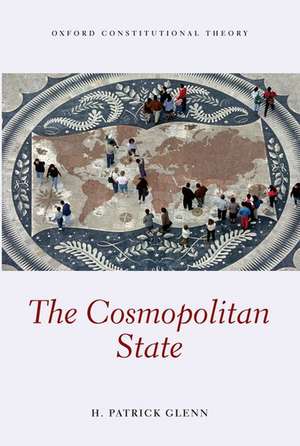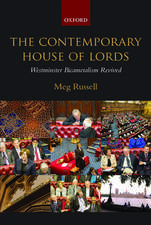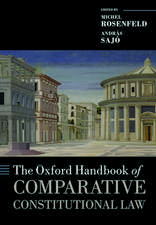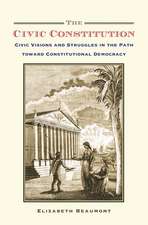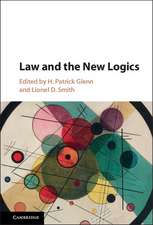The Cosmopolitan State: Oxford Constitutional Theory
Autor H. Patrick Glennen Limba Engleză Hardback – 23 mai 2013
Din seria Oxford Constitutional Theory
- 21%
 Preț: 592.17 lei
Preț: 592.17 lei - 25%
 Preț: 660.38 lei
Preț: 660.38 lei - 12%
 Preț: 661.62 lei
Preț: 661.62 lei - 12%
 Preț: 298.56 lei
Preț: 298.56 lei - 14%
 Preț: 268.76 lei
Preț: 268.76 lei -
 Preț: 289.51 lei
Preț: 289.51 lei - 30%
 Preț: 595.04 lei
Preț: 595.04 lei - 25%
 Preț: 628.46 lei
Preț: 628.46 lei - 13%
 Preț: 569.46 lei
Preț: 569.46 lei - 30%
 Preț: 591.65 lei
Preț: 591.65 lei - 30%
 Preț: 515.28 lei
Preț: 515.28 lei - 30%
 Preț: 521.33 lei
Preț: 521.33 lei - 30%
 Preț: 600.01 lei
Preț: 600.01 lei - 23%
 Preț: 367.83 lei
Preț: 367.83 lei -
 Preț: 345.44 lei
Preț: 345.44 lei - 13%
 Preț: 263.13 lei
Preț: 263.13 lei - 18%
 Preț: 219.80 lei
Preț: 219.80 lei -
 Preț: 342.53 lei
Preț: 342.53 lei -
 Preț: 336.74 lei
Preț: 336.74 lei - 18%
 Preț: 341.61 lei
Preț: 341.61 lei - 26%
 Preț: 685.83 lei
Preț: 685.83 lei - 14%
 Preț: 294.28 lei
Preț: 294.28 lei - 30%
 Preț: 595.25 lei
Preț: 595.25 lei - 12%
 Preț: 316.18 lei
Preț: 316.18 lei - 26%
 Preț: 328.53 lei
Preț: 328.53 lei -
 Preț: 310.25 lei
Preț: 310.25 lei - 19%
 Preț: 264.69 lei
Preț: 264.69 lei - 13%
 Preț: 274.68 lei
Preț: 274.68 lei -
 Preț: 322.84 lei
Preț: 322.84 lei - 30%
 Preț: 599.25 lei
Preț: 599.25 lei - 26%
 Preț: 552.04 lei
Preț: 552.04 lei - 27%
 Preț: 689.37 lei
Preț: 689.37 lei
Preț: 646.49 lei
Preț vechi: 924.67 lei
-30% Nou
Puncte Express: 970
Preț estimativ în valută:
123.70€ • 129.50$ • 102.36£
123.70€ • 129.50$ • 102.36£
Carte tipărită la comandă
Livrare economică 26 martie-01 aprilie
Preluare comenzi: 021 569.72.76
Specificații
ISBN-13: 9780199682423
ISBN-10: 0199682429
Pagini: 400
Dimensiuni: 170 x 241 x 29 mm
Greutate: 0.76 kg
Editura: Oxford University Press
Colecția OUP Oxford
Seria Oxford Constitutional Theory
Locul publicării:Oxford, United Kingdom
ISBN-10: 0199682429
Pagini: 400
Dimensiuni: 170 x 241 x 29 mm
Greutate: 0.76 kg
Editura: Oxford University Press
Colecția OUP Oxford
Seria Oxford Constitutional Theory
Locul publicării:Oxford, United Kingdom
Recenzii
Glenn provides us once more with an essential contribution to the development of an updated general theory of state.
The Cosmopolitan State is presented to us in an impressive way by H. Patrick Glenn...[it is a] must read!
The Cosmopolitan State is presented to us in an impressive way by H. Patrick Glenn...[it is a] must read!
Notă biografică
H. Patrick Glenn is the Peter M. Laing Professor of Law, McGill University, Montreal, and a former Director of the McGill Institute of Comparative Law. He is a member of the Royal Society of Canada and the International Academy of Comparative law. He has been a Killam Research Fellow, a Bora Laskin National Fellow in Human Rights Research, a recipient of the Quebec Government's Léon Gérin Prize in the Social Sciences, a Visiting Fellow of All Souls College, Oxford, and a holder of the Henry G. Schermers Fellowship of the Hague Institute for the Internationalisation of Law and the Netherlands Institute of Advanced Studies. His book Legal Traditions of the World (OUP, 4th ed., 2010) received the Grand Prize of the International Academy of Comparative Law. In 2011 he gave the General Course in Private International Law at the Hague Academy of International Law.
